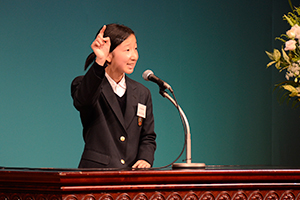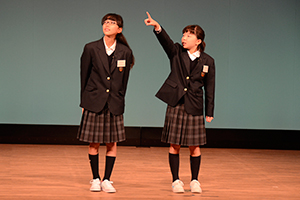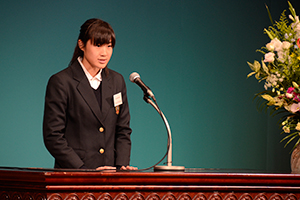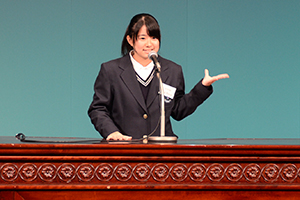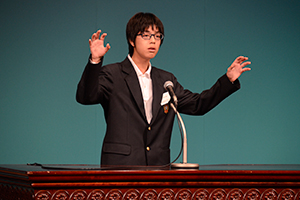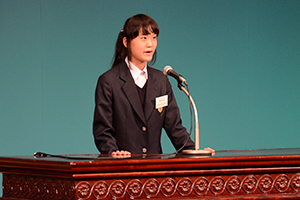第13回中学生英語スピーチ大会:受賞者一覧・英語スピーチ内容
更新日:2016年1月4日
市長賞
| 氏名 | 中学校名 | 学年 |
|---|---|---|
| 西村 聡、木俣 勇哉 | 勝山 | 1年 |
| 吉田 路 | 西ノ岡 | 2年 |
| 東 蓮太朗 | 寺戸 | 3年 |
教育長賞
| 氏名 | 中学校名 | 学年 |
|---|---|---|
| 江口 あすか、樽谷 樹葉 | 西ノ岡 | 1年 |
| 藤原 星羅 | 西ノ岡 | 2年 |
| 服部 花厘 | 寺戸 | 3年 |
優秀賞
| 氏名 | 中学校名 | 学年 |
|---|---|---|
| 清水 歩美、中地 結璃愛 | 寺戸 | 1年 |
| 堀江 政弘 | 西ノ岡 | 2年 |
| 坂下 絵美華 | 勝山 | 3年 |
英語スピーチ内容
You are Kaguya boy.(君はかぐやボーイだ。)」西村 聡、木俣 勇哉(勝山中学1年生)
A: Excuse me, where’s the Muko City Astronomy Observatory? I’m lost.
B: Oh, it’s next to Muko Shrine.
A: Is that far from here? Do I take the bus?
B: Don’t worry, it’s near! Go straight, and turn left at the next traffic light.
A: That traffic light on the corner?
B: Right! Then walk about three minutes.
A: Is the observatory on the left or the right?
B: On the left, next to the tall tree. Well, follow me, please.
A: Thank you! I got my rocket!
B: Your rocket? Wow! That bamboo is so dazzling!
A: Thank you very much! Now I can go home. I can go to the moon!
B: …?
A: Just as I thought, humans are so kind.
A: すみません。向日市天文館はどこですか。迷ってしまいました。
B: ああ、向日神社の隣ですよ。
A: ここから遠いですか。バスに乗るんですか。
B: 心配しないで、近いですよ。まっすぐ行って、次の信号を左に曲がってください。
A: 角のあの信号ですか。
B: そうです。それから3分ほど歩いてください。
A: 天文館は右側ですか、左側ですか。
B: 左側で、大きな木の隣ですよ。ええっと、ぼくについてきてください。
A: ありがとう!私のロケットがあった!
B: 君のロケット?うわあ。あの竹、まぶしい!
A: 本当にありがとう。これで家に帰れます。月へ帰れます!
B: …?
A: やっぱり、地球人はとても親切だ。
「Alone(ひとりきり)」吉田 路(西ノ岡中学2年生)
内容は、著作権上の理由により、掲載しておりません。
「The Fading of Cultures (消えゆく文化)」東 蓮太朗(寺戸中学3年生)
I like watching movies very much. Especially I like foreign movies. Because I learn a lot about foreign cultures. If you watched an American movie, it should make you feel like being in the United States. It is a completely different culture from what you know.
What is “culture"? Culture has many aspects like language, religion, arts, and customs and so on. Culture is a lifestyle. And they are shared by a particular group of people. How many cultures are there in the world? Some say 9 but others say 90 thousand. It is said that there are about 6,500 languages in the world, so I think the number of 90 thousand is not so unrealistic. Isn't it exciting to know there are 90 thousand different cultures around the world which you are not familiar with?
I think most people agree that learning other cultures is fun. And it is no doubt that to protect cultures is important. But sometimes the difference between cultures is not respected and creates hatred. Recently I watched news that some historical and religious heritages were destroyed by extremists. Sadly, we human have wars between different cultures for a long time. Moreover we often hear the word ”Globalization” these days. This “Globalization” makes our lifestyle change, everyone in the world is to take up similar lifestyles. Do you know that many countries are losing some part of their culture day by day? For example, it is said that the number of languages will be cut in half at the beginning of the 22nd century. Our world is always changing and new things are being created. But we are also losing something at the same time.
I think there is no right or wrong in cultures. It is only understanding of and respect that we must have for other cultures. By protecting our own culture and by accepting new ideas, I hope there is no collisions of culture someday. And everyone in the world will feel happy everyday.
Please imagine “How would it be like if there was only one culture in the world?”
私は映画が大好きです。特に外国の映画が大好きです。なぜなら、映画は私に多くの外国の文化を教えてくれるからです。もし、あなたがアメリカの映画を見たとしましょう。映画はあなたを実際にアメリカにいるような気分にさせてくれます。それは自分が知っている文化とは完全に異なったものなのです。
文化とは何なのでしょうか。文化には言語や宗教、芸術や習慣など様々な側面があります。文化とは生活そのものなのです。そして、それは特定の人々のグループによって共有されているものです。いくつの文化がこの世界にはあるのでしょうか。誰かが「9」と言えば、他の誰かは「9万」と言います。世界には約6500の言語があると言われています。だから、私は9万という数は非現実的ではない気がします。世界中にあなたの知らない9万ものいろいろな文化があると思うとワクワクしませんか。
異文化を学ぶことはおもしろいという意見に多くの人が同意できると思います。また、文化を守ることが大切であるということそのものに疑問はありません。しかし、それと同時に文化間での対立が起きているのも確かです。最近、私は歴史的建造物や宗教的建造物が文化間の論争により、壊されているニュースを見ました。悲しいことに、私たち人間は、このような異なった文化間で長い間争いをしてきています。さらに、最近では「グローバル化」という言葉がよく聞かれるようになりました。このグローバル化が進むことによって、世界中で同じような生活様式が取られるようになり、固有の文化が減りつつあるのを知っていますか。例えば、言語はこのままいくと、22世紀に入るまでに半分になると言われています。世界は常に変化し、新しいものを作りだします。しかし、その引き換えに失われているものもあります。
私は文化に正しいや正しくないはないと思います。私たちが異文化に対して持たなければならないのは理解と尊重だけです。自分の文化を守りつつ、新しいものを受け入れる心を持つことで、いつか、そういった文化間の対立がなくなり、誰もが幸せに暮らす世界になることを祈っています。
もし、世界の文化が1つだけだったら・・・。想像してみてください。
「HALLOWEEN FOR KIDS(子どもたちのためのハロウィーン)」江口 あすか、樽谷 樹葉(西ノ岡中学1年生)
A: Here we are. This is the Halloween party for kids!
B: It's very crowded. There are a lot of kids in their Halloween costumes!
A: What are they doing in that house? Are they helping their mother?
B: No, they aren't. They are carrying pumpkin baskets. Kids say "Trick or treat", then people from the houses give them candies.
A: Woh! That's great. I love to do that.
B: Look! It says, "Trick or treating only for 12 years old and below". We're 13 years old now.
A: That's too bad.
B: Don't worry! Let's just watch the Vampire movie at my house. We can see the cutest vampire ever.
A: All right. Let's go!
A:さぁ着いたよ。こどものためのハロウィーンパーティーだよ。
B:とても混雑しているね。ハロウィーン衣装の子どもたちがたくさんいるね。
A:あの家の中で何をしているの? お母さんを手伝っているのかい?
B:いいえ。 彼らはかぼちゃのかごを運んでいるのだよ。 子どもたちが「おかしをくれないといたずらするぞ」と言うと、家の人たちが飴をくれるんだ。
A:わぁ、それはすごいね。私もそれがしたいわ。
B:見て。「トリックオアトリートは12歳以下」と書いてあるよ。私たちは今13歳だわ。
A:残念だわ。
B:心配しないで。私の家に来てヴァンパイア映画を観ましょ。今までで一番可愛らしいヴァンパイアが観られるわ。
A:わかったわ。さぁ行きましょう。
「Grandma Baba and her Friends on a Sleigh(そりにのった ばばばあちゃんと 友だち)」藤原 星羅(西ノ岡中学2年生)
内容は、著作権上の理由により、掲載しておりません。
「Japan, As Seen From the World(世界から見た日本)」服部 花厘(寺戸中学3年生)
I lived in Manila, the Philippines, when I was thirteen, for two years. I saw and felt many things there. So I'd like to tell you about the image of Japan from Manila.
First, Japan is safe. There are vending machines in the city. Vending machines are proof that Japan is safe. In a country which isn't safe, people steal vending machines. And, that's why, also, The Summit Conference, where the world leaders gather, is going to be held in Iseshima,Japan, next year.
Second, Japanese people are honest. To arrive five minutes before for work or school is not surprising. Moreover, the Japanese are very serious about their work.
Third, Japanese “Omotenashi”. “Omotenashi” is like a motto for the Tokyo Olympics. It is taken for granted in Japan. But “Omotenashi” is appreciated by foreigners. Please remember this when you go to some stores. Have you experienced this before? Once, in Manila, a clerk was talking with another clerk and she didn't notice me. When I went to the supermarket. And I wasn't greeted with a smile. I think this is rare in Japan. It hardly ever happens. However, this isn't strange in overseas. That's why, foreigners are so surprised at Japan's excellent hospitality. We can be proud of “Omotenashi”.
However, I think any great country has some improvement points. For example, The Japanese can't say “NO” clearly when we want to deny or refuse something. We regard this as being modest. I don't think being modest is bad. But some foreigners think Japanese people are not good at self-assertion and self-expression. But these are necessary to increase the businesses with people all over the world. So now is the time for the Japanese people to strive to be more confident and assertive, in order to do better in the business world.
As I mentioned, Japan has many good points, which I told you about already. If Japanese people can express themselves more and more in the world, then we can be even more proud of Japan.
Where are you from? I'm from Japan.
私は中一と中二の二年間、フィリピンのマニラに住んでいました。そこで、私はたくさんのものを目にし、感じることで発見した日本の姿について紹介します。
一つ目は、とても治安がいいことです。その証拠に、日本には自動販売機が町中のいたるところにあります。治安の悪い国だと、自動販売機ごと盗まれてしまうそうです。日本は治安が良いことから、来年には日本の伊勢志摩で世界の首脳が集まる国連主要国首脳会議が開かれます。
二つ目は、とても誠実だということです。五分前行動は当たり前で時間をしっかりと守ります。それに加え、ビジネスの場面でも、仕事に対して丁寧だと定評があります。
三つ目は、「おもてなし」の心です。「おもてなし」は東京オリンピックに向けてのモットーのようなものです。この「おもてなし」は日本では当たり前のようにありますが、外国からすれば、本当に素晴らしいことなのです。お店に行ったときの店員さんの姿を思い出して下さい。こんな経験はありますか。マニラではスーパーマーケットに行ったとき、店員さんがほかの店員との話に夢中で私に気づかないなんてことありました。笑顔で対応されないこともあります。日本ではこんなことほとんどないと思います。もしあったとしても、数えられる程度だと思います。しかし、これは外国ではよくあることです。そのため、海外からの観光客の方々は日本のサービスの高さにたいへん驚かれるのです。日本のおもてなしは世界に誇れるところです。
しかし、どんなに素晴らしいとされる国にも改善できるところがあります。例えば、日本人は何かを否定したり断ったりするときに、はっきりとNOと言えないことです。これは日本では慎み深いという言い方をします。私は慎み深いことが悪いことだとは思いませんが、外国の方からすれば、自己表現や自己主張が苦手だという風にうつっているようです。自己表現や自己主張は現在の外国とのビジネスの機会を増やすのに必要でしょう。世界のビジネスでより活躍するために、日本人はもっと自信を持ち、主張しようとすることが今必要なのです。
ここまで述べたように、日本にはたくさんのいいところがあります。もし、日本人がもっと自分の意見を言えることができたら、日本という国がもっと誇れる国になるのではないでしょうか。
Where are you from? I'm from Japan.
「Where is Muko Shrine?(向日神社はどこ?)」清水 歩美、中地 結璃愛(寺戸中学1年生)
A: Excuse me, where is Muko Shrine?
B: Oh, it's on Saigoku Street.
A: Is that far from here? Should I take the bus?
B: Don't worry, it's near! Go straight, and turn right…
A: Stop! Please speak more slowly.
B: OK. Go straight, and turn right at the supermarket.
A: Mmm… Is it “Kanzakiya”?
B: Right! Then walk about five minutes. You can see the entrance of Muko Shrine.
A: Is Muko Shrine on the left or on the right?
B: It's at the end of the road.
A: Just go straight?
B: Yes!
A: Thank you!
B: By the way, why do you know “Kanzakiya”?
A: It's near my grandparents' house.
B: What? So you must know where Muko Shrine is!
A: すみません、向日神社はどこですか?
B: 西国街道にありますよ。
A: ここから遠いですか?バスに乗らないといけませんか?
B: 心配しなくても近くですよ。まっすぐ行って、右に曲がって…
A: 待って!もう少しゆっくりしゃべってください。
B: わかりました。まっすぐ行ってスーパーを右に曲がってください。
A: うーんと、それは神崎屋ですか?
B: そうです。それから5分くらい歩きます。そうすれば向日神社の鳥居が見えてきます。
A: 向日神社は左か右、どっちですか?
B: どんつきです。
A: まっすぐ行ったらいいですか?
B: はい。
A: ありがとうございます。
B: ところでなんで神崎屋を知っているんですか?
A: 祖父母の家の近くなんです。
B: それなら知ってるはずでしょ!
「Red Demon and Blue Demon(赤おに と 青おに))」堀江 政弘(西ノ岡中学2年生)
内容は、著作権上の理由により、掲載しておりません。
「Another point of view(別の視点で)」坂下 絵美華(勝山中学3年生)
"Oh, no! I changed my mind again. Why do I always change my mind?" I don't like myself or my way of thinking. I'm so weak. Recently I'm so negative that I often think I don't want to do it, I don't want to do it. For example, I don't want to practice ballet, I don't want to enter this speech contest.
But I couldn't stop practicing ballet, and I'm here to make my English speech. After all, I have changed my mind. "I'm so weak." This kind of thinking makes me depressed.
One summer day, I watched a TV program only to kill time. I happened to watch the local news. An old woman completing a full marathon talked to the interviewer. She said, "Running is fun for me. I love running. Time is not important. For me running itself is the most important." An idea came to mind. I asked to myself, "Do I like ballet? Do I like English?" I answered, "Of course I do." Again I asked, "Do I enjoy ballet? Do I enjoy English?" The answer was" I'm afraid I don't!"
I found my problem. I thought about only the result, not the process. At first I liked to practice ballet and English. It was fun. Nowadays, I only think of the result: taking the leading role on the concert or winning the first prize on the contest. I forgot to enjoy ballet and English.
I have found another point of view. If I find something interesting, I will try it and enjoy it. Now I have motivation. I don't have to care about the results. Let's enjoy the process.
「あーぁ、また決めたことを変えた。なぜ、私はいつも決めたことをかえるんだろう。」わたしは、自分自身や自分の思考パターンが好きではありません。私はすごく弱い。最近、私はとてもネガティブでしばしばやりたくない、やりたくないと考えていました。例えば、バレエの練習はしたくない、今回のスピーチコンテストには出たくない、などと考えていました。
でも、バレエの練習はやめることができなかったし、こうしてここで英語のスピーチをしているんです。結局は、心変わりしているのです。「私って、本当に弱いな。」こんな風に考えると、わたしは、落ち込んでしまいます。
ある夏の日のことです。わたしは暇つぶしにテレビ番組を見ていました。その時、たまたまローカルニュースを見ました。フルマラソンを完走した年配の女性がインタビューに答えていました。「走るのは楽しいですよ。私は走るのが大好きです。タイムなんて問題ではありません。私にとっては走ることそのものが、一番大切なのです。」と彼女は言っていました。ふとある考えが頭をよぎりました。私は自問しました。「わたしはバレーが好きなの。わたしは英語が好きなの。」私は答えました。「もちろん好きです」再び自問しました。「わたしはバレエを楽しんでいるの。わたしは英語を楽しんでいるの。」その答えは「残念ながら、楽しんでいない」でした。
私は自分の課題に気付きました。わたしは結果ばかりを考えて、そこにいたる過程を考えていませんでした。初めのうちは、バレエや英語の練習は好きでした。楽しかったのです。ところが最近では結果ばかりを考えています。バレエの発表会で主役をとりたいとか、スピーチコンテストでは最優秀賞をとりたいなどです。わたしは、バレエや英語を楽しむことを忘れていたのです。
わたしは別の考え方に気付きました。もし何か面白いことを見つけたら、それに挑戦したり、楽しめばいいのです。わたしには今、やる気があります。結果を気にする必要はないのです。過程そのものを楽しみましょう。

-
教育委員会 教育部 学校教育課
電話 075-931-1111(代表) ファクス 075-931-2555
教育委員会 教育部 学校教育課へのお問い合わせ


